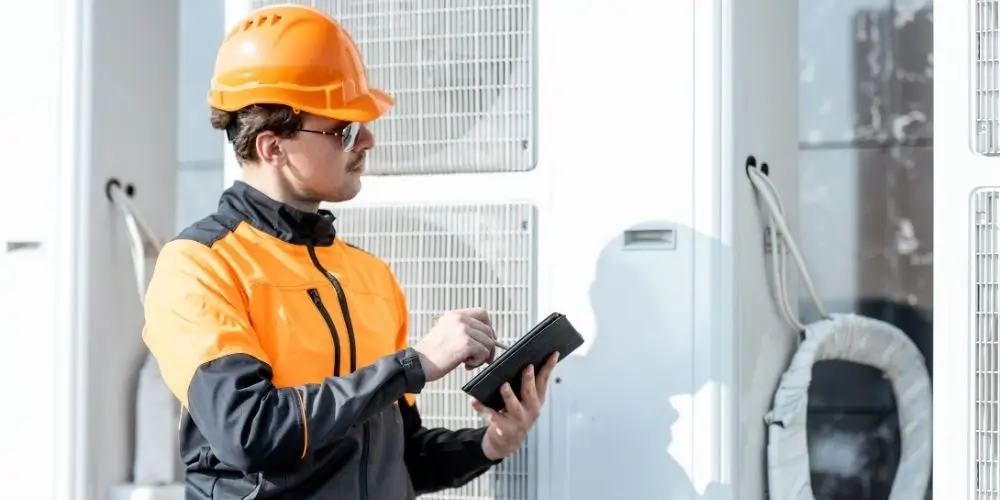

When the Texas heat rolls in, your air conditioning system isn’t just a luxury—it’s a necessity. Air conditioning is crucial for comfort and health during hot weather, helping to prevent heat-related illnesses and maintain safe indoor environments.
For homeowners in Spring, TX, regular maintenance of your air conditioner is essential to keep cool air flowing, maintain good energy efficiency, and avoid surprise breakdowns when temperatures spike. Air conditioning systems work by removing heat from enclosed spaces, regulating temperature and humidity to maintain comfortable indoor conditions.
This guide will walk you through how to properly maintain your air conditioning system, save money on energy bills, and extend the life of your cooling unit.
Routine air conditioning maintenance helps your system run efficiently, improves indoor air quality, and ensures comfort throughout the year. Regular maintenance is essential for your entire hvac system, not just the air conditioner. A well-maintained air conditioner doesn’t have to work as hard to produce cool air, which reduces energy consumption and helps cut down on rising energy costs—especially during hot Texas summers. Maintenance is important for both heating and cooling functions in combined systems.
Even if your AC seems to be working fine, skipping maintenance can lead to problems like:
Reduced cooling efficiency
Clogged filters and coils
Higher energy usage
Shortened system lifespan
Air conditioners work by using a cooling cycle to remove heat from indoor air, transferring it outside to cool your living space.
Before we dive into the checklist, let’s break down the components of most cooling systems:
Indoor Unit: Often includes the indoor air handler, which contains the evaporator coil and blower fan to circulate and filter air throughout your home.
Outdoor Unit: Houses the condenser coil and compressor.
Thermostat: Controls temperature and activates the system.
Duct System (for central air conditioning systems): Central systems use integrated ductwork to efficiently move air between rooms in your entire home, cooling multiple spaces from a single, centralized setup.
There are several types of air conditioning systems:
Central air conditioner: Uses ductwork to cool multiple rooms or the entire home.
Split system: Features separate indoor and outdoor units. Ductless systems, also known as mini-splits, use multiple indoor units connected to a single outdoor unit, allowing for zoned cooling and flexibility without ductwork.
Portable units: Movable cooling systems with indoor and outdoor components connected by hoses, offering flexibility for different spaces.
Window air conditioner/window unit: Installed in a window frame or through a wall opening, these units are ideal for cooling single rooms and can sometimes be converted into heat pumps. They are easy to install and remove, fitting snugly within the window frame or wall.
Packaged air conditioner: Combines all components in one unit, typically installed outside or on the roof.
Heat pump: Provides both heating and cooling by reversing the refrigerant cycle, offering energy efficiency and year-round comfort.
Some systems also include a heating system for comprehensive climate control.
When selecting a system, consider choosing an energy efficient model to save on energy costs and reduce environmental impact.

Dirty filters reduce airflow, strain the system, and blow dust through your indoor space. Change them every 1–3 months depending on use and indoor pets.
Improves indoor air quality
Boosts energy efficiency
Helps deliver consistent cool air
Dust and debris on your evaporator coil or outdoor coil insulate the system and reduce heat exchange.
Turn off power and gently clean with a soft brush or coil cleaner
Keep outdoor units clear of leaves and debris for airflow
A clogged drain line can cause leaks or moisture damage inside your indoor unit.
Flush with vinegar and water solution
Check for mold or mildew buildup
If you’re not using a smart thermostat, consider upgrading. These optimize your system and can save you significantly on energy usage.
Program for efficiency during times you’re away
Keep consistent room temperature settings for comfort
Leaky ducts can waste up to 30% of your cooled air. A professional can test and seal them to reduce energy consumption.
Look for disconnected joints or holes
Insulate exposed ductwork
A well-sealed and insulated duct system is essential for getting the most out of your air conditioning system. Leaky ducts can let up to 30% of cooled air escape before it ever reaches your rooms, which means your air conditioner has to work harder, driving up energy costs and reducing cooling efficiency. To keep your system running smoothly, inspect your ductwork for any visible gaps, holes, or disconnected joints. Use mastic sealant or metal tape to seal leaks—avoid regular duct tape, as it doesn’t hold up over time. For added efficiency, insulate accessible ducts in attics, crawlspaces, and garages to prevent heat gain or loss. Make sure vents and registers are tightly sealed where they meet floors, walls, and ceilings. By taking these steps, you’ll help your air conditioner unit deliver more cool air where you need it, lower your energy bills, and improve the quality of your indoor air.
Refrigerant is the lifeblood of your air conditioning system, and leaks can seriously impact its performance. If your air conditioner starts blowing warm air, you notice ice forming on the evaporator coil, or you hear a hissing sound coming from the unit, you may have a refrigerant leak. These leaks not only reduce cooling efficiency but can also cause your energy bills to climb as the system struggles to keep your home comfortable. If you suspect a refrigerant issue, turn off your air conditioning system and call a professional HVAC technician right away. They have the equipment to accurately detect leaks, repair the problem, and safely recharge the refrigerant. Prompt attention to refrigerant leaks protects your air conditioning system from further damage and helps maintain efficient, reliable cooling.
The capacitor and contactor are two small but vital parts of your air conditioning system, responsible for starting and running the compressor and fan motors. Over time, capacitors can wear out, swell, or even leak, while contactors may become dirty or pitted, leading to poor electrical contact. To keep your air conditioner running reliably, check the capacitor for any signs of damage and replace it if needed. Clean the contactor to ensure it makes a solid connection and doesn’t overheat. If these components fail, your air conditioner may not start or could stop working unexpectedly, resulting in uncomfortable indoor temperatures and higher energy bills. Regular attention to these parts helps your system maintain peak performance and can prevent costly breakdowns.

In Spring, TX, spring and early summer are ideal times to prep your air conditioning system for the long hot months ahead.
Schedule a professional AC tune-up before temperatures rise
Adjust thermostat settings for different temperatures throughout the day
Ensure both indoor and outdoor units are clean and functional
Use smart thermostats for consistent cooling efficiency
Staying on top of regular maintenance is the best way to keep your air conditioning system running efficiently and avoid unexpected repairs. Set up a maintenance schedule that includes tasks like cleaning or replacing the air filter, inspecting ducts for leaks, and checking refrigerant levels. Mark your calendar or use a smart thermostat to set reminders for these important jobs, as well as for scheduling professional tune-ups. Keeping your air conditioning system well-maintained not only helps lower your energy bills but also improves indoor air quality and extends the life of your equipment. With a little planning, you can ensure your system is always ready to keep your home cool and comfortable.
When your air conditioning system isn’t working as it should, a few simple troubleshooting steps can help you get things back on track. If you notice warm air coming from the vents, start by checking the air filter and replacing it if it’s dirty. Inspect the ducts for any leaks or damage and seal any gaps you find. Make sure your thermostat is set to the right temperature and is functioning properly. If you hear unusual noises, see leaks, or the system still isn’t cooling, it’s time to call a professional HVAC technician. Addressing issues early can prevent minor problems from turning into major repairs, helping your air conditioning system maintain efficient cooling and a comfortable indoor environment.

While regular maintenance can be handled at home, certain issues need a pro:
AC isn’t blowing cold air
Strange noises or unusual smells
Poor airflow or short cycling
Frozen coils or refrigerant leaks
Maintenance for systems like heat pumps or older central air conditioners
Issues with heating or your heating system, such as lack of heat, unusual operation, or the need for seasonal inspection
If your air conditioner unit struggles to keep up or your energy bills keep climbing, a technician can assess the system for deeper problems.
Every bit of maintenance you perform adds up to long-term savings:
Comply with Energy Star recommendations
Reduce strain for better energy efficiency
Lower your overall energy costs
Improve air quality in enclosed indoor spaces
And when your system runs efficiently, you avoid costly repairs, extend its lifespan, and stay cool—no matter how hot it gets in Spring, TX.
For even greater savings, consider upgrading to energy efficient systems or components that are designed to maximize performance and minimize energy use.
Maintaining your air conditioning system isn’t just about comfort—it’s about protecting your investment, minimizing energy usage, and keeping your indoor air clean and safe. With just a little attention and seasonal care, you’ll enjoy uninterrupted comfort and lower utility bills all year round.
If you're looking for expert care, inspections, or AC tune-ups in Spring, TX, our local team is ready to help. We service all types of air conditioners, including central air, window units, split systems, and more.
Call today to schedule a professional maintenance check and keep your system running at peak performance.




